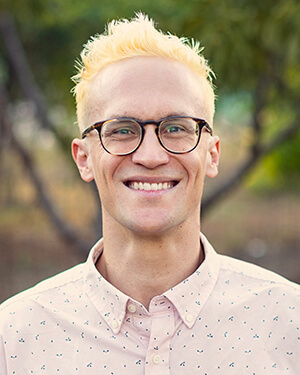Ryan Cheney, LMSW

Ryan Cheney, LMSW
Licensed Master Social Worker
Supervised by: Steffanie Strawbridge, LCSW-S
How I Work
Therapy is a partnership in which we take the time to slow down together and look compassionately at what’s happening inside of you and in your relationships. It’s a courageous act in service of becoming a fuller version of yourself.
One of my primary goals in therapy is to align how we work together to your way of being. I’m intentional about the extent to which we draw upon and integrate the influences of feeling, thinking, felt body sensation, and behavior. All of your humanity is welcome, and our work together is tailored to you.
I work with individuals (ages 13 and older), couples, and families. I work to be practical and results-oriented.
Specialties:
- Depression
- Anxiety
- Stress
- Trauma
- Self-esteem
- Couples therapy
- Family therapy
- Addictions and substance use
- Mindful eating & body image concerns
- Suicidality and self-harm
- Personality disorders
- Grief and loss
- Conflict resolution
- Polyamory
- Corporate relationship counseling & mediation
Trainings and Certifications
- Internal Family Systems (IFS) – Certified IFS-informed therapist. Completed 4-month training with renowned IFS trainer Derek Scott
- Somatic Experiencing (SE) International – Certified Level 1 Practitioner
- Solutions Focused Brief Therapy (SFBT) – Completed 20 hour training
- Modular Approach to Therapy for Children with Anxiety, Depression, Trauma, or Conduct Problems (MATCH-ADTC)
- Cognitive Behavioral Therapy (CBT)
- Trauma Focused Cognitive Behavioral Therapy (TF-CBT)
Practice Philosophy
Internal Family Systems (IFS) is my preferred model for healing. It holds that we each have a higher Self which is innate and undamageable, and distinct “parts” which develop strategies to serve the Self.
For example, say a friend invites you to a pool party. You may have a part of you that really likes being social which wants you to go, and another part which is scared of being judged when showing up in a bathing suit in front of your friends. IFS makes space to get to know both of these parts of you, exploring what they’re saying to you, how they feel, and what they want for you.
IFS views pain and turmoil as driven by parts of us that ultimately want to serve us, which may have learned strategies that have outlived their usefulness. It holds that we have all of the resources that we need, and that we’re constrained as a result of troubled relationships with parts of ourselves. Working with parts has a tendency to loosen the grip of self-criticism as we move from identifying with a difficult feeling or behavior (e.g. “I am unlovable.”) to the view that we have a part which experiences that (“A part of me feels unlovable.”).
IFS helps us shift from inner conflict as our parts battle each other to greater self-understanding and self-acceptance as we learn what our parts want for us. It also helps us get precise as we transition from experiencing ourselves as a monolith of overlapping thoughts and feelings to an experience of being in direct relationship with our parts.
Additionally, I value integrating felt body sensation in therapy. In my experience, the body holds a lot of wisdom, and I’ve seen many clients benefit from slowing down and welcoming their somatic experience.
Preferred modalities
- Internal Family Systems (IFS)
- Somatic Experiencing (SE)
- Intimacy from the Inside Out (IFIO)
- Gottman Method Couples Therapy
- Emotion-Focused Therapy (EFT)
- Existential Psychotherapy
Couples Therapy
Intimate relationships can be hard and couples therapy can be scary. It can also be illuminating, cathartic, and transformative.
When working with couples, I get curious with them to explore the roots of their challenges, discern which of their challenges are solvable and which are unsolvable, and commit to practical strategies for working on solvable challenges if they both agree to it.
At first, we work to ensure that each partner is heard by the other. We work to better understand the feelings which animate conflict and then explore the unmet needs producing those feelings. We’re explicit about unmet needs, and explore what it might look like for the relationship to meet them. If both/all of the partners agree to it, we craft the specifics of the work that each partner will do, aiming to improve the relationship for both/all partners. We hold everyone accountable and witness what in the relationship shifts and what remains static as we do the good work.
I welcome couples in conflict, and work with both polyamorous and monogamous couples.
My Story
I love math and science, and studied engineering and art in college. Thereafter, I started a company and worked with a team of incredible people to grow it over 10 years. Committed to directing more of my attention toward inner worlds, I completed graduate studies at UT Austin’s Steve Hicks School of Social Work. I’ve worked as a counselor for employees at Goodwill, for people living in the inpatient forensic psychiatry unit at Austin State Hospital, and for kids and families at LifeWorks.
Outside of the therapy room, I love rock climbing, chess, circling, dancing, and yoga. I love supporting folks as a therapist and I view the work as a great privilege. I hope one day to start a therapy collective that integrates psychotherapy with body-based practices like yoga, meditation, fasting, silence, and nature solos.
